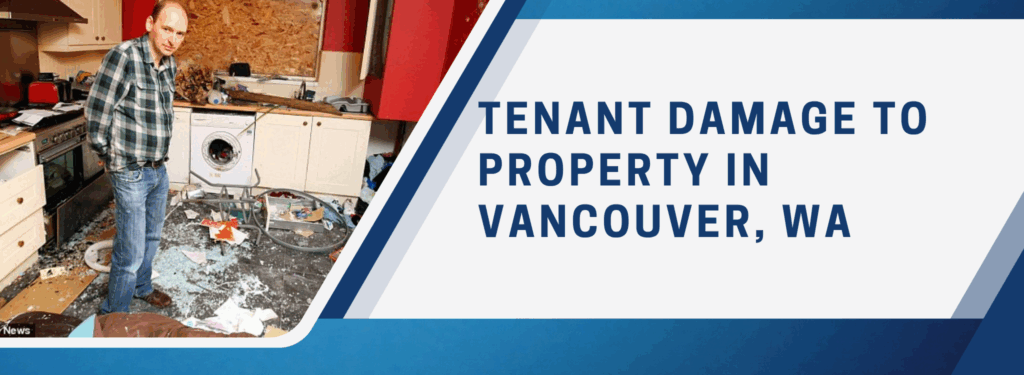
Common Types of Tenant Damage in Vancouver, WA Properties
In Vancouver, WA, managing tenant damage to rental property is integral to real estate. Tenants’ damage often includes stains on carpets and scratches on wooden floors, which are usually caused by pets or heavy foot traffic.
The walls are also often broken because renters leave holes in the walls from the nails or screws they used to hang pictures. Many uses can also damage kitchen tools, leading to problems like broken handles or parts that don’t work right.
Bathrooms often show neglect, such as mold from insufficient air flow and water damage from plumbing leaks. Also, doors and windows may be broken, such as their locks broken or the glass panes cracking, which makes the property less safe.
Landlords can help tenants avoid these problems in Vancouver’s rental market by having regular inspections and a detailed lease agreement.
Assessing and Documenting Tenant-Induced Property Damage
To protect your investment, it’s essential to carefully review and write down any damage tenants have caused to your Vancouver, WA home. First, thoroughly inspect the property, paying special attention to walls, floors, fixtures, and items likely to be damaged by normal wear and tear or carelessness.
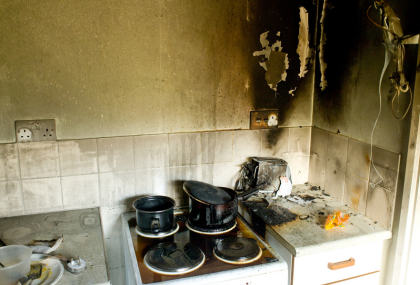
Take high-resolution pictures and videos of the damage to get clear proof. Ensure each image has a time stamp to prove it is real. To prove that a tenant damaged your property, you must keep both visual and written records that fully explain the problems you saw and how bad they were.
It is essential to compare the current results to inspection reports or move-in condition checklists from the past to see what changes were caused by the tenant living there. When dealing with property damage claims or disputes involving tenants in Vancouver’s competitive real estate market, it’s essential to be accurate and keep detailed records. This will help with any court proceedings or insurance claims that may be needed.
Steps to Take When Discovering Tenant Damage in Your Rental Property
To protect your investment, it’s essential to carefully look over and write down any damage tenants have caused to your Vancouver, WA home. First, thoroughly inspect the property, paying special attention to walls, floors, fixtures, and items likely to be damaged by normal wear and tear or carelessness.
Take high-resolution pictures and videos of the damage to get clear proof. Ensure each image has a time stamp to prove it is real. To prove that a tenant damaged your property, you must keep both visual and written records that fully explain the problems you saw and how bad they were.
It is essential to compare the current results to inspection reports or move-in condition checklists from the past to see what changes were caused by the tenant living there. When dealing with property damage claims or disputes involving tenants in Vancouver’s competitive real estate market, it’s essential to be accurate and keep detailed records. This will help with any court proceedings or insurance claims that may be needed.
The Role of Security Deposits in Covering Tenant-caused Damages
Security deposits are significant in fixing damage caused by tenants in Vancouver, WA, rental properties. As a financial safety net for landlords, these deposits ensure that any repairs or upkeep needed because of careless tenants can be covered without the owner paying extra money.

When people move into a rental place, they usually give the landlord a security deposit. The landlord keeps this deposit safe for the length of the lease. This deposit protects the owner against damage to the property that goes beyond standard wear and tear.
If the renter breaks something, holes appear in the walls, or the carpet gets stained, the landlord may use some or all of the security deposit to fix the problem. To avoid arguments over taking money out of the security deposit, keeping good records and discussing what damage the tenant did is essential.
In Vancouver, WA, landlords must follow local rules about handling and returning security deposits. Landlords must provide detailed statements if any deductions are made for damage repair. By using security deposits wisely, landlords can keep their properties in good shape while being fair to renters.
Insurance Coverage Options for Landlords Against Tenant Damage
In Vancouver, WA, owners can protect their real estate investments against damage caused by tenants in many ways. One of the most important things to consider is landlord insurance, which usually covers damage to the building caused by renters.
Homeowners’ insurance can reduce the cost of damage from vandalism or accidents. Many landlords also choose liability insurance to protect themselves from possible lawsuits resulting from tenants’ actions that harm others or damage their property.
Some plans have extra add-ons that are meant to cover the financial effects of things that happen to tenants, like losing rental income because the house needs significant repairs and can’t be lived in. It’s essential for landlords to carefully look over their insurance plans and talk to insurance experts in Vancouver to make sure they have full coverage that fits the risks of renting out homes in Vancouver’s ever-changing real estate market. Sell With Isaac can help guide you through the process with expertise and care. You can read our reviews and also explore how we buy houses.
Legal Recourse for Landlords Facing Property Damage in Vancouver, WA
Owners of rental property in Vancouver, WA, have several legal options regarding damage to their property. Tenants in Washington state are required by law to take care of their rental homes and return them in the same shape as when they moved in, minus normal wear and tear.
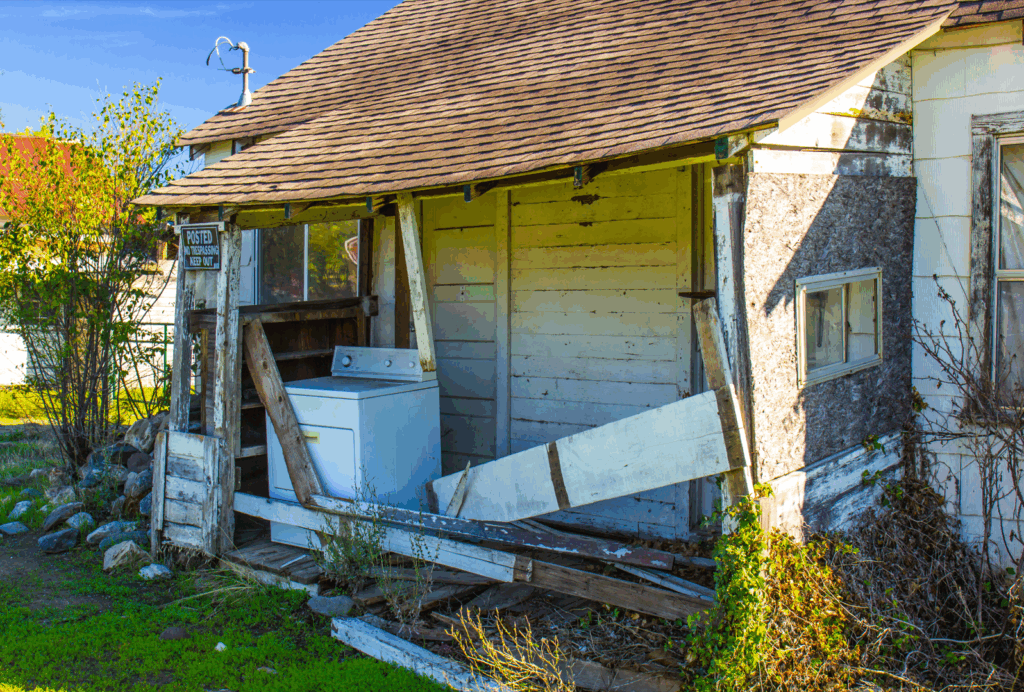
If a landlord finds damage to the property that isn’t caused by standard wear and tear, they can use the security deposit to pay for the repairs. Landlords must keep careful records of all damage, including photos and specific descriptions.
There is a small claims court where owners can file a lawsuit for damages up to $10,000 if the security deposit does not fully cover the costs of the damage or if more action is needed. Landlords should follow the legal steps spelled out in their lease agreements and talk to a real estate lawyer in their area about how to handle possible disagreements.
When landlords in Vancouver know about these legal options, they can protect their capital and ensure they follow local rules and tenant rights laws. We buy houses in Vancouver, Camas, Battle Ground, Ridgefield, and Washougal. We buy houses as-is and even buy houses with termite damage.
Dispute Resolution: Handling Conflicts Over Alleged Damages
In the Vancouver, WA real estate market, it’s essential to handle disagreements about tenants’ claimed damage to rental property in a way that keeps landlord-tenant relationships positive and protects investment properties. When there are problems, landlords must thoroughly inspect the property to ensure they correctly record any damage.
It’s important to be clear with tenants, and landlords should back up their claims with proof like photos or repair records. The rules of the lease can help clarify who is responsible for repairs and damages.
Mediation is often a good way to settle a disagreement because it gives both sides a chance to say what’s bothering them and find a solution that works for everyone without making things worse. If mediation doesn’t work, landlords may have to go to small claims court, but this should only be done as a last option because it could be expensive and take a long time.
By using these tips, landlords in Vancouver can handle arguments over damage to their tenants’ property more effectively, ensuring everyone is treated fairly while reducing conflicts.
Fair Wear and Tear Versus Actual Property Damage Claims
When dealing with renter damage in Vancouver, WA real estate, it is essential to distinguish between fair wear and tear and actual property damage claims. “Fair wear and tear” means that a rental property will naturally and slowly fall apart over time from everyday use.
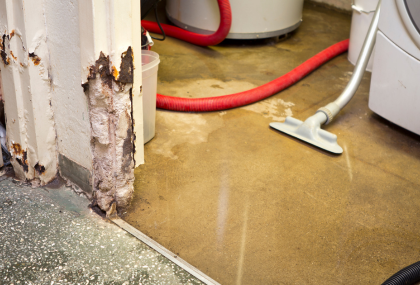
In this case, small scratches on the walls, faded paint, or worn rugs are all examples. On the other hand, real property damage, like broken windows, holes in the walls, or a lot of water damage, is usually caused by tenants’ carelessness or misuse.
Landlords need to carefully look at each case to ensure they are making correct claims and protecting the rights of their tenants. A good plan includes thorough inspections of the property before and after each rental period and keeping detailed records of its state.
Using clear wording in lease agreements about what the tenant is responsible for regarding maintenance can help avoid confusion. By keeping these things in mind, Vancouver landlords can easily deal with property damage while also building good relationships with their tenants.
Eviction Processes Related to Extensive Property Damage by Tenants
Landlords in Vancouver, WA, need to know how to evict renters who have damaged their property extensively. The first step is to carefully record the damage with photos, quotes for repairs, and detailed reports.
This paperwork can be used as proof in any court case. To stay out of trouble with the law, landlords in Washington must also ensure they follow the state’s renter rights and eviction rules.
It is essential to give the tenant a formal notice. This notice should describe the damage clearly and provide the tenant with a date to repair or leave the property. If the tenant doesn’t fix the problem within the time limit, the landlord can sue to evict the tenant in Clark County Superior Court.
To ensure smoothness, managers must strictly follow all legal requirements and deadlines during the eviction process. Hiring real estate lawyers with extensive experience and knowledge of the local rules can be very helpful during this complicated process.
Repairing and Restoring Damaged Rental Properties
Using best practices for fixing and restoring rental properties is essential for keeping the property’s value and ensuring tenants are happy when dealing with damage caused by tenants in Vancouver, WA real estate. First, do a full check to determine how bad the damage is. Take pictures and write down lots of information to keep track of everything.
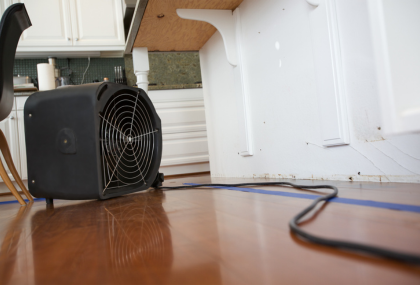
This paperwork is essential for insurance claims and for future use. Make any pressing repairs right away, like fixing broken windows or plumbing problems, to prevent the property from getting worse and to keep tenants safe.
It’s important to hire licensed contractors in Vancouver, WA, who know the city’s building codes and rules. This will ensure that all fixes are legal. Consider using long-lasting materials that can handle normal wear and tear, which will make it less likely that problems will happen again.
Keeping the lines of communication open with the renters during this process builds trust and cooperation, making it easier to set up repair times and get to the property. By doing regular maintenance checks, you can find problems before they get worse and cause a lot of damage, which will protect your investment in the long run.
Professional Services for Assessments of Rental Property Damage
When it comes to Vancouver, WA real estate, handling damage to rental property often requires the help of professional services for accurate assessments. Hiring experts to evaluate damage to rental properties can make handling problems quickly and correctly much easier.
These professionals know how to find obvious and secret damage, ensuring nothing is missed. Landlords can use their thorough reports to make wise choices about repairs and maintenance that need to be done.
Professional assessors also offer a neutral view, which is very important when renters disagree about who is responsible for damages and how much they should pay. Using their services not only speeds up the process but also protects your investment by keeping the property in good shape and its value high.
This proactive method helps keep minor problems from turning into expensive repairs, which in turn helps your rental properties last longer and make more money in Vancouver’s competitive real estate market.
Implications of Neglecting Tenant-induced Repairs
When tenants demand fixes in Vancouver, WA real estate, owners can lose a lot of money if they don’t make them. Damage that isn’t fixed immediately often leads to higher repair costs as minor problems like taps that leak or small cracks in the wall get worse and need more expensive fixes.
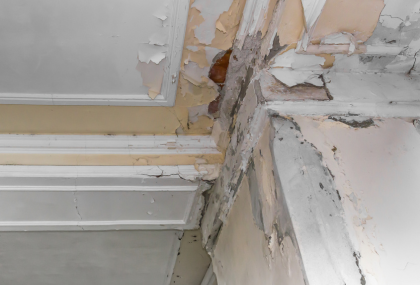
Damage to property that isn’t fixed can also lower the general value of a rental unit, making it less appealing to potential tenants and possibly leading to long vacancies that lower rental income. If insurers find that negligence led to the damage, property owners may also have to pay more for insurance or have trouble getting coverage in the future.
Also, maintenance problems that aren’t fixed could lead to legal problems if they break health and safety rules, which could add to the financial risks through fines or lawsuits. Landlords can protect their investment, ensure a steady stream of income, and stay in line with local rules and laws by taking charge of repairs caused by tenants.
Who Is Responsible When a Tenant Damages the Landlord’s Property?
Both landlords and renters need to know their responsibilities regarding tenant damage in Vancouver, WA real estate. If a tenant damages a landlord’s property beyond regular wear and tear, the tenant usually has to pay for repairs or make up for the damage.
This duty comes from the lease agreement in most cases. In Vancouver, WA, landlords must inspect their properties thoroughly before and after a tenant moves out to keep records of the property’s state.
If damage happens, renters can use the security deposit to pay for repairs if they follow the rules for deductions in Washington state. Both sides need to speak clearly and take care of any problems quickly.
Landlords should teach renters how to properly care for and maintain their rental units, and they should know that they need to report any damage immediately. By communicating clearly and following the rules in their area, landlords in Vancouver can handle property damage caused by tenants and keep their investments in good shape.
How Long Does a Landlord Have to Make Repairs in Washington State?
In Washington State, landlords must fix things within a certain time to ensure tenants are safe and the owner follows the housing rules. Washington State law says landlords usually have 10 days from getting written notice from a tenant to start making fixes that aren’t emergencies.
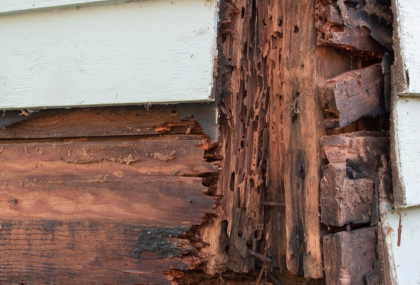
If problems with the heating, water, or electricity make the rental property unlivable, like an emergency repair that needs to be done right away, the landlord must do so. Managing renter damage to property well is important for keeping landlord-tenant relationships positive and ensuring properties stay in good shape in Vancouver, WA real estate.
Landlords can avoid lawsuits and ensure their properties meet health and safety standards by learning about their state’s repair deadline rules. Taking care of fix requests the right way protects the value of your investment property and makes tenants happier and more likely to stay in the competitive Vancouver rental market.
Is It Worth Suing a Tenant for Damages?
Landlords in Vancouver, WA, must consider many important things before deciding whether to sue a renter for damage to their property. The choice depends on how bad the damage is and how much it costs compared to what could be recovered through legal action.
Often, filing a lawsuit takes a lot of time and money, with court fees and other legal costs that may be higher than the real damages. Also, landlords should consider different ways to settle disagreements with tenants, like mediation or direct negotiation, which might lead to a better, less expensive answer.
It’s also essential to check the tenant’s finances; if they don’t have any assets or income, it might be hard to pay any damages. Landlords also need to ensure they have clear copies of the lease agreement and proof of damage to help their case in court.
Ultimately, landlords in Vancouver should carefully consider all aspects before going to court to handle tenant property damage effectively. Litigation may be necessary in cases of significant property damage or repeated offenses.
How to Properly Inspect a Rental Property for Potential Damages
Vancouver, WA, rental property owners must carefully check each one for any damage that might have occurred. Before letting new renters move in, it’s important to carefully check the whole house, paying special attention to areas likely to be damaged.
Start by looking at the outside. Look for problems like roof leaks, foundation cracks, or broken siding that could be signs of bigger structural issues. Check your home’s walls, ceilings, and floors for signs of water damage or mold, especially in places that get a lot of moisture, like bathrooms and kitchens.
Please pay close attention to plumbing tools and fixtures to make sure they work right and don’t have any leaks. Thorough tests should be done on electrical systems. Check that outlets work and look for any exposed wires that could be dangerous.
Remember to check the windows and doors. Make sure they open and close easily and firmly. Also, look for broken glass or frames that could make the home less safe or energy efficient. Carefully write down all of your findings using photos and detailed notes to record the property’s state correctly before the tenant moves in.
| LANDLORD AND TENANT | STATE OF WASHINGTON | MONETARY DAMAGES | UNLAWFUL DETAINER | EVICTION NOTICES | LEASES |
| LEASING | INSURANCE COMPANY | RECEIPTS | PREVENTATIVE MAINTENANCE | PLUMBING SYSTEMS | LEGAL RIGHTS |
| MONEY | PLANTS | PESTS | LEGISLATION | INFESTATIONS | HOUSE |
| DEPRECIATION | DEPRECIATED | APARTMENTS |
Helpful Vancouver Blog Articles
- Sell Your Vancouver, WA, Home With Code Violations
- Tenant Damage To Property In Vancouver, WA
- How To Sell My House To A Developer In Vancouver, WA
- How To Sell A House With Termites In Vancouver, WA
- Capital Gains Tax After Selling A House In Vancouver, WA
- Selling A House With Title Issues In Vancouver, WA
- Squatters’ Rights In Vancouver, WA
- Sell Your House In Vancouver, WA, Using A Quitclaim Deed
- Who Is Paying Taxes When Selling A Home In Vancouver, WA
- Selling A Water-damaged House In Vancouver, WA
- Selling Your Inherited House In Vancouver, WA
- Selling A House With Asbestos In Vancouver, WA
- Home Equity For Selling Your House In Vancouver, WA
- Tips For Downsizing Your Home In Vancouver, WA
- Vancouver, WA Neighborhood Map
- Vancouver, WA Property Managers
- Understanding Vancouver, WA Property Tax Rate

